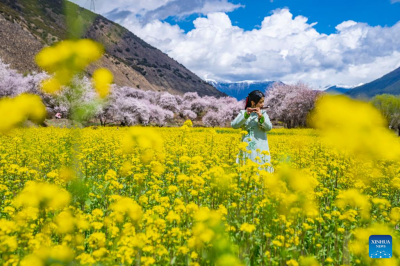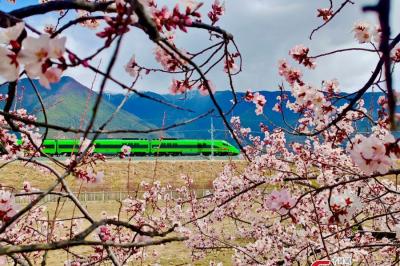| Aug.3,2018--In the early morning, the first rays of sunlight have just climbed over the snow mountains, shining softly over the crystal clear and white Kachentso Salt Lake. Accompanying the da da da sound of knocking, a group of villagers wearing long boots and holding ox horns bend over to break large, crystallized pieces of salt on the lake surface in the distance, carefully stacking the smaller pieces into piles.
Gongjue Tsering, mayor of Yanhu Township, told reporters that this traditional manual salt mining method has been used for hundreds of years.
Kachentso Lake is located in Yanhu Township, Gegye County, Ngari Prefecture, Tibet. The people who have been born and raised up around the salt lake have made their livings off of the salt for centuries.
According to elderly locals, there used to be many salt caravans stationed here. Due to poor road conditions, they would load the collected natural salt into woolen bags, conveying them on the backs of sheep to Burang County in Ngari, Shigatse, and even to India and Nepal, bartering with merchants to trade for highland barley, tea bricks, and other necessities. Over time, they pioneered the renowned "Salt and Sheep Road".
In June 2018, the local custom of transporting salt by sheep was included in the fifth Tibet Autonomous Region intangible cultural heritage list.
48-year-old Trasang's ancestors all lived by the side of the salt lake. His father Chuwang was once a merchant on the ancient "Salt and Sheep Road", and he often heard his father speak about how his grandfather herded sheep and traded for goods on the Salt and Sheep Road.
"The least number of sheep they had was 20, but at most they had over a hundred carrying salt, which was a spectacular sight."
Trasang explained that his father would be out for two or three months, traveling with Trasang's grandfather to Burang in Ngari and selling salt in Nepal, trading for some local tea bricks, cloth, highland barley, and other essential items.
"My father said that along the way, there was a mountain cliff road that was very dangerous. Every time he passed through with his sheep, he felt as if he was passing by death." |
- Home
- News Tibet |Exclusive |China |World |Related News |Latest
- Documents White Papers |Others
- Photo Politics |Economy & Society |Culture & Religion |Human & Nature |Beautiful Tibet |Other Tibetan-Inhabited Area |Exchanges |Related
- Video News |Documentary |Micro-Video |Entertainment
- Art
- Tourism
- In Focus
- About Tibet






